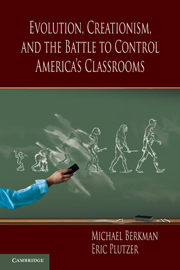Book contents
- Frontmatter
- Contents
- Figures
- Tables
- Acknowledgments
- Introduction
- 1 Who Should Decide What Children Are Taught?
- 2 The Public Speaks: “Teach Both”
- 3 A Nation Divided by Religion, Education, and Place
- 4 Is Evolution Fit for Polite Company? Science Standards in the American States
- 5 Teachers and What They Teach
- 6 State Standards Meet Street-Level Bureaucracy
- 7 When the Personal Becomes Pedagogical
- 8 Teachers in Their Schools and Communities
- 9 The Battle for America’s Classrooms
- Appendix to Chapter 2
- Appendix to Chapter 3
- Appendix to Chapter 4
- Appendix to Chapter 5
- Appendix to Chapter 6
- References
- Judicial Opinions and Court Cases Cited
- Index
4 - Is Evolution Fit for Polite Company? Science Standards in the American States
Published online by Cambridge University Press: 05 June 2012
- Frontmatter
- Contents
- Figures
- Tables
- Acknowledgments
- Introduction
- 1 Who Should Decide What Children Are Taught?
- 2 The Public Speaks: “Teach Both”
- 3 A Nation Divided by Religion, Education, and Place
- 4 Is Evolution Fit for Polite Company? Science Standards in the American States
- 5 Teachers and What They Teach
- 6 State Standards Meet Street-Level Bureaucracy
- 7 When the Personal Becomes Pedagogical
- 8 Teachers in Their Schools and Communities
- 9 The Battle for America’s Classrooms
- Appendix to Chapter 2
- Appendix to Chapter 3
- Appendix to Chapter 4
- Appendix to Chapter 5
- Appendix to Chapter 6
- References
- Judicial Opinions and Court Cases Cited
- Index
Summary
The recently proposed “Nature of Science” statement in the Science Curriculum Framework for California Public Schools represents an appalling imposition of the religion of evolutionary humanism upon our public school system and will be deeply resented and opposed by a very large number of concerned parents and other citizens if adopted.
Henry Morris, and the faculty and staff of the Institute for Creation Research (1988)The proposed revisions to the commonly accepted definition of science are so far removed from the consensus views of scientists and science teachers that their inclusion in the state standards would seriously jeopardize the quality of science instruction in Kansas. Most troubling is the distinct probability that such changes would hamper students in their future quests for success in our increasingly technologically and scientifically advanced world.
Robert Dennison, President, Texas Association of Biology Teachers (2003)As the United States entered the twenty-first century, more than forty years after Sputnik jump-started science education reform, the Ohio Department of Education did not think it necessary that its public school students learn about biological evolution. Ohio's state curricular content standards, described on its Education Department's Web page as “the what of what students should know,” made no mention at all of the term “evolution.” Under the auspices of the standards-supporting Fordham Foundation, a research team led by physicist Lawrence Lerner assessed the evolution content of states’ science standards on an A to F grading scale and awarded Ohio one of twelve Fs reserved for states “who fail so thoroughly to teach evolution as to render their standards totally useless” (Lerner 2000b, 16). Ohio treats evolution, wrote Lerner, “as if it were not proper conversation in polite company” (2000b, 16).
Public high school students in neighboring Indiana, on the other hand, were offered an “exemplary” treatment of evolution (Lerner 2000b). Science education scholars Gerald Skoog and Kimberly Bilica also reviewed state standards and found approvingly that Indiana required instruction in all eight concepts they identified as “central to understanding evolution” (Skoog and Bilica 2002, 448; see also Donnelly and Sadler 2009). When a new Fordham Foundation team led by biologist Paul R. Gross (2005) took a fresh look at slightly revised Indiana science standards – including not only biology but the entire science curriculum – Indiana again received a grade of A and was lauded relative to other states for its many “positive factors for which we looked in vain in many of the others” (38). But it was noteworthy that Gross, while acknowledging how Indiana “stands out” for its straightforward discussion of evolution generally and of human evolution specifically, gave voice to a warning: “Sad to say,” he wrote, “we hear of political moves in this state to derogate or downgrade the teaching of evolution. Should this happen, Indiana will go the tragic way of Kansas” (Gross 2005, 38).
- Type
- Chapter
- Information
- Publisher: Cambridge University PressPrint publication year: 2010

